Tuesday Feb 17, 2026
Tuesday Feb 17, 2026
Wednesday, 10 July 2024 00:20 - - {{hitsCtrl.values.hits}}
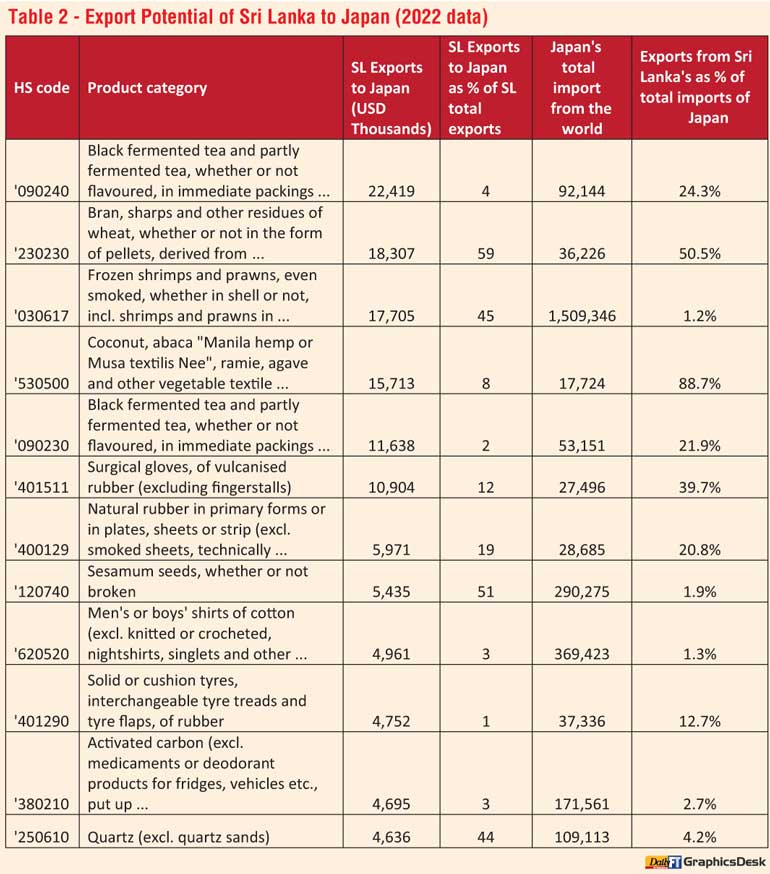
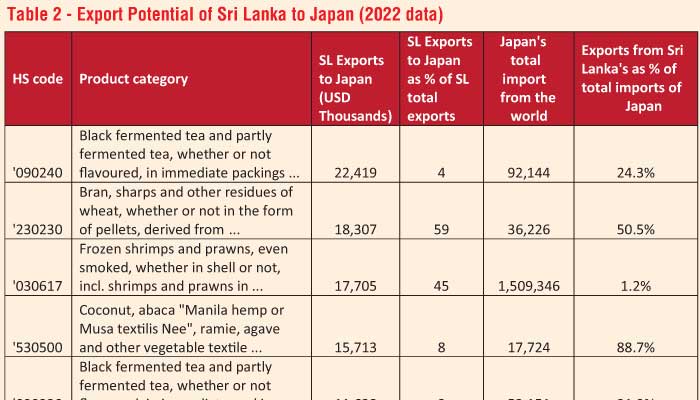
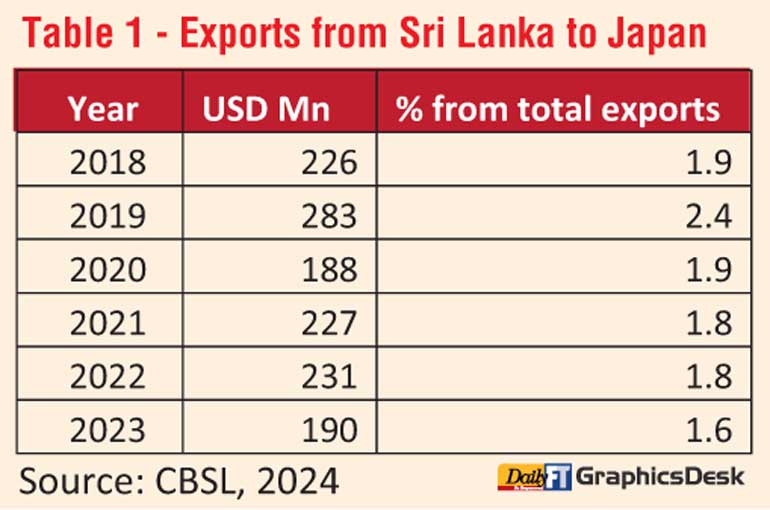
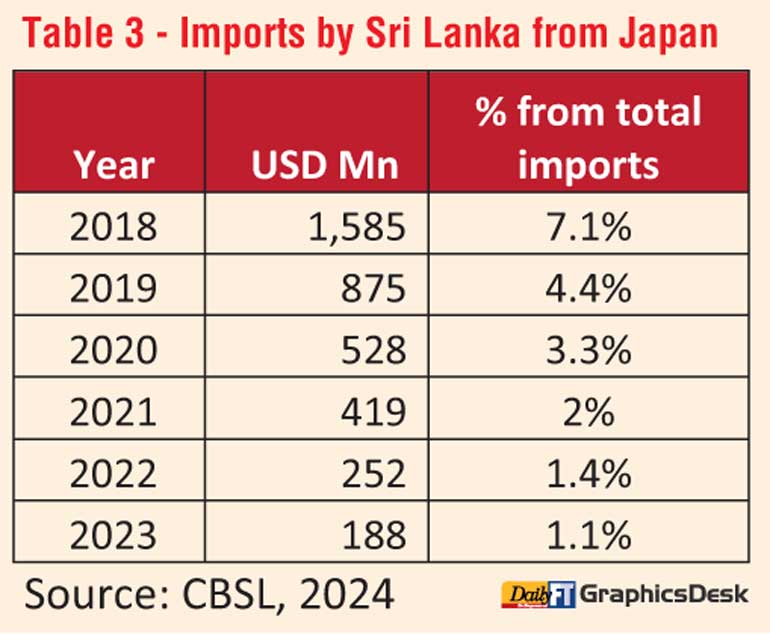

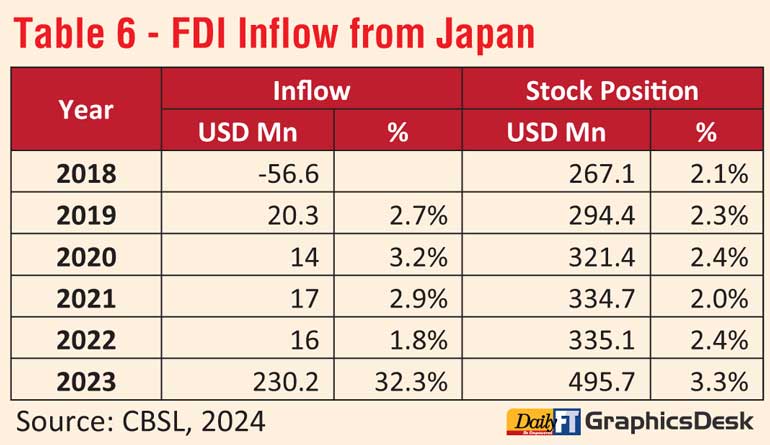
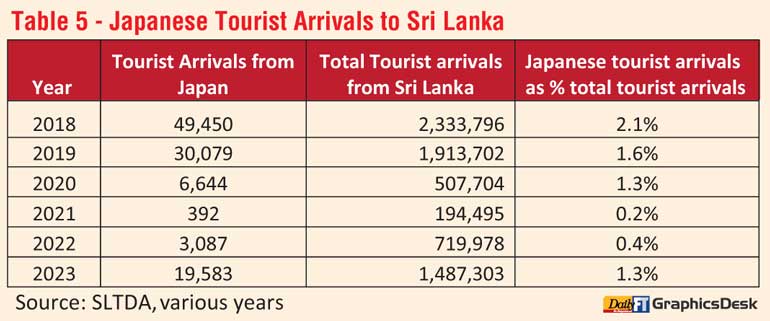
 Japan has always been a benevolent partner in the development trajectory of Sri Lanka. Japan is the world’s fourth largest economy in terms of GDP. This article explores the bilateral trade, investment and tourism. The article is exclusively focused on bilateral economic relations and not going to explore the development cooperation due to space constraints.
Japan has always been a benevolent partner in the development trajectory of Sri Lanka. Japan is the world’s fourth largest economy in terms of GDP. This article explores the bilateral trade, investment and tourism. The article is exclusively focused on bilateral economic relations and not going to explore the development cooperation due to space constraints.
Bilateral trade
As illustrated in Table 1.1, Sri Lanka’s export to Japan during 2018-23 period remained below $ 300 million. In 2020, with the outbreak of the COVID-19 pandemic, Sri Lanka’s exports to Japan has reduced to $ 188 million yet recovered in 2021 and 2022 recording total exports of $ 227 million and 231 million respectively. However, in 2023 the total export to Japan has declined to $ 190 million.
According to the export data published by CBSL, Japan is the 13th largest export destination of Sri Lanka in 2023. The major export commodities from Sri Lanka includes tea, shrimps and prawns, coconut products, apparel and rubber products, etc.
Table 02 demonstrates the export potential of Sri Lanka compared to Japan’s total imports under each category utilising data in 2022. As per Table 2, it is evident there is immense potential for Sri Lanka to grow the exports to Japan in following listed product categories. For example, under HS Code 090240 (black fermented tea and partly fermented tea, whether or not flavoured…), Sri Lanka has exported $ 22.41 million worth commodities which is only 24.3% of Japan’s total imports from the rest of the world.
It is noteworthy, Sri Lanka has been able to exceed the 50% mark only in the two product categories mentioned above, HS code 530500 (coconut, abaca “Manila hemp or Musa textilis Nee”, ramie, agave and other vegetable textile ...) and HS code 230230 (bran, sharps and other residues of wheat, whether or not in the form of pellets, derived from…). Accordingly, it is evident there is untapped potential for Sri Lankan exporters in the Japanese market.
Considering Sri Lanka’s remarkable performance in ICT/BPO service exports, the country needs to explore further, available opportunities in the same sector in Japan.
According to Table 3, it is evident since the implementation of restriction of motor vehicle imports, the total imports from Japan has decreased gradually from $ 1,585 million in 2018 to $ 188 million in 2023. According to the import data published by CBSL, Japan is the 22nd largest import market for Sri Lanka in 2023.
As illustrated in Table 4, the trade balance is in favour of Japan during the pre-pandemic period which gradually declined over the years since the implementation of restriction on motor-vehicle imports. As per the CBSL data in 2023 the trade balance is in favour of Sri Lanka.
Media reports during the recent past indicate Sri Lanka is planning to establish a Japan-Sri Lanka Free Trade Zone.
Tourism industry
Table 5 illustrates Japanese tourist arrivals to Sri Lanka. After the easing of COVID-19 travel restrictions, tourist arrivals have reached to 19,583 in 2023. However, it may be noted Japanese tourist arrivals as % of total tourist arrivals has not reached to the pre-pandemic level in 2023. As per Table 5, in 2018 Japanese tourist arrivals as % of total tourist arrivals of Sri Lanka was 2.1%. However, in 2023 it remains at 1.3%.
Apart from German travellers, Japanese are known for their interest to experience wellness tourism which is a high value segment of the tourism industry. Hence, tourism industry stakeholders should focus more on the Japanese market to attract more travellers.
Investment
After the outbreak of the COVID-19 pandemic in 2020, Japan announced an economic stimulus package to help its manufacturers shift production out of China to create diverse and resilient supply chains. Although, several ASEAN countries made optimum use of the opportunity, Sri Lanka was not up to the task. Table 6 illustrates FDI inflow from Japan to Sri Lanka.
Sri Lanka presently experiences unprecedented socio-economic challenges with the sovereign debt default in 2022. Accordingly, it is in the best interest of Sri Lanka to have a cordial economic relationship with Japan.
(The writer is a postgraduate qualified socio-economic policy researcher, and can be contacted via [email protected]. He wishes to thank the Resident Representative of JETRO Colombo office for review and comments on the draft.)